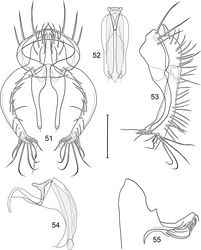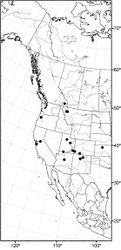Allotrichoma sabroskyi
| Notice: | This page is derived from the original publication listed below, whose author(s) should always be credited. Further contributors may edit and improve the content of this page and, consequently, need to be credited as well (see page history). Any assessment of factual correctness requires a careful review of the original article as well as of subsequent contributions.
If you are uncertain whether your planned contribution is correct or not, we suggest that you use the associated discussion page instead of editing the page directly. This page should be cited as follows (rationale):
Citation formats to copy and paste
BibTeX: @article{Mathis2012ZooKeys161, RIS/ Endnote: TY - JOUR Wikipedia/ Citizendium: <ref name="Mathis2012ZooKeys161">{{Citation See also the citation download page at the journal. |
Ordo: Diptera
Familia: Ephydridae
Genus: Allotrichoma
Name
Allotrichoma sabroskyi Mathis & Zatwarnicki, 2012 sp. n. – Wikispecies link – ZooBank link – Pensoft Profile
Description
This species is distinguished from congeners by the following combination of characters: Small shore flies, body length 1.40–1.75 mm. Head: Medial facial carina above facial prominence shallow; labella broad, fleshy, shorter than mediproboscis; clypeus microtomentose, usually gray.
Thorax: Presutural supra-alar seta present. Pleural area lacking stripes. Wing with costal vein ratio 0.33–0.36; M vein ratio 0.43–0.44. Legs blackish brown to black; midtibia bearing numerous, erect setae along dorsal surface.
Abdomen: Male 5th sternal process in lateral view (Fig. 55) moderately elongate, narrow, bearing 4–5 tuberculate setulae apically; 5th medial process in lateral view (Fig. 55) elongate, shallowly curved, bearing 7–8 setulae anteroapically. Male terminalia (Figs 51–54): Epandrium in posterior view (Fig. 51) ovately rounded on dorsal half, wider than high; epandrium in lateral view (Fig. 52) with anterior and posterior margins of dorsal half nearly straight and parallel sided; cercus robust, thick, in posterior view (Fig. 51) pointed dorsally, gradually broadened ventrally then rather abruptly curved laterally and ventrally as a slightly tapered, elongate process that bears numerous long setulae apically and along posterior margin; cercus in lateral view (Fig. 52) slightly curved, wider dorsally, ventral half nearly parallel sided, apex broadened and bearing setulae; surstyli in posterior view (Fig. 51) as parallel, narrow, elongate processes that bear setulae on apical portion, apex narrowly rounded; surstylus in lateral view (Fig. 52) shallowly curved, basal half slightly tapered, apical half almost parallel sided, apical portion bearing short setulae, apex tapered to narrow point; aedeagus in ventral view (Fig. 53) elongate, moderately narrowly ovate, tapered apically, in lateral view (Fig. 54) narrowly elongate, somewhat lunate; phallapodeme in lateral view (Fig. 54) very narrowly triangular, digitiform keel shorter than length, pointed; gonite in ventral view (Fig. 53) bar-like, very slightly wider basally, apex with short, lateral process, apex bearing setula, in lateral view (Fig. 54) wide basally, gently curved, tapered to apical point, with a subapical, short process that bears a setula.
Type material
The holotype male is labeled “USA. N[ew]M[exico]. Sandoval: LaCueva(Hhwys 126&4; 35°52'N, 106°38.4'W; 2342 m), 6 Aug 2007,D.&W.N.Mathis/ HOLOTYPE ♂ Allotrichoma sabroskyi W. Mathis & T. Zatwarnicki USNM [red]/USNM ENT 00117960 [plastic bar code label].” The holotype is double mounted (minuten in a block of plastic elastomer), is in excellent condition, and is deposited in the USNM. Forty-five paratypes (44♂, 1♀; USNM) bear the same locality label as the holotype.
Type locality
United States. New Mexico. Sandoval: La Cueva (Junction of Highways 126 and 4; 35°52'N, 106°38.4'W; 2342 m).
Other specimens examined from the New World
CANADA. BRITISH COLUMBIA. Wasa Lake (49°47.4'N, 115°44.1'W), 17 Jul 1974, P. H. Arnaud, Jr. (1♂, 1♀; CAS).
UNITED STATES. ARIZONA. Coconino: Flagstaff (35°N, 111°44.3'W), 10 Jun 1909 (1♂; USNM); Oak Creek (18 km N Sedona; 35°N, 111°44.3'W), 13 Apr 2003, W. N. Mathis, T. Zatwarnicki (9♂, 5♀; USNM).
CALIFORNIA. Amador: Buena Vista (38°17.4'N, 120°54.8'W), F. R. Cole (1♂; USNM). Santa Clara: San Jose (37°20.4'N, 121°53.7'W), 8 Sep 1949, L. W. Quate (2♀; USNM).
COLORADO. Archuleta: Pagosa Springs (37°15.8'N, 107°00.7'W), 27 May 1969, W. W. Wirth (2♂; USNM). Dolores: Cahone (9 km N, Dolores River; 37°38.9'N, 108°44.1'W; 1955 m), 3 Aug 2007, D. and W. N. Mathis (2♂; USNM).
KANSAS. Rooks: Webster Dam (39°24.5'N, 99°25.5'W), 1 Sep 1961, D. L. Deonier (1♂; USNM).
MONTANA. Lake: Big Fork (13 km NE; 47°50'N, 113°53'W), 9 Aug 1969, B. A. Foote (2♂; USNM); Dayton (47°52'N, 114°16.7'W), 13 Jul 1935, A. L. Melander (1♂; USNM).
NEW MEXICO. Sandoval: Valles Caldera National Preserve, Alamo Canyon (middle pond; 35°54.9'N, 106°35'W; 2645 m), 4 Aug 2008, D. and W. N. Mathis (1♂; USNM). Taos: Rio Grande (36°18.3'N, 105°46.1'W), 6 Jul 1953, W. W. Wirth (1♂; USNM).
OREGON. Benton: Corvallis, Dixon Creek (44°34.5'N, 123°15.2'W), 24 Aug 1974, W. N. Mathis (1♂; USNM).
UTAH. Carbon: Deadman Canyon (16 km NE Price; 39°41.7'N, 110°44'W; 2055 m), 19 Aug 2009, T. Zatwarnicki (1♂; USNM). Kane: Kanab (37°02.8'N, 112°31.6'W), 14 Jul 1948, G. F. Knowlton (1♂; USNM). Salt Lake: Butterfield Canyon (40°29.2'N, 112°08.2'W; 1890 m), 13 Aug 2008, D. and W. N. Mathis (1♂; USNM). San Juan: Johnson Canyon (21 km W Blanding: 37°47.6'N, 109°30.7'W; 2335 m), 2 Aug 2007, D. and W. N. Mathis (1♂; USNM).
Distribution
(Fig. 56) Nearctic: Canada (British Columbia), United States (Arizona, California, Colorado, Kansas, Montana, New Mexico, Oregon, Utah).
Etymology
The species epithet, sabroskyi, is a genitive patronym to honor Curtis W. Sabrosky. Curt was our mentor and friend and always had time to assist and respond to our numerous questions.
Original Description
- Mathis, W; Zatwarnicki, T; 2012: Revision of New World Species of the Shore-fly Subgenus Allotrichoma Becker of the Genus Allotrichoma with Description of the Subgenus Neotrichoma (Diptera, Ephydridae, Hecamedini) ZooKeys, 161: 1-101. doi
Images
|

